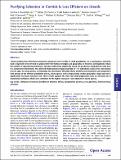Purifying selection in corvids is less efficient on islands
Abstract
Theory predicts that deleterious mutations accumulate more readily in small populations. As a consequence, mutation load is expected to be elevated in species where life-history strategies and geographic or historical contingencies reduce the number of reproducing individuals. Yet, few studies have empirically tested this prediction using genome-wide data in a comparative framework. We collected whole-genome sequencing data for 147 individuals across seven crow species (Corvus spp.). For each species, we estimated the distribution of fitness effects of deleterious mutations and compared it with proxies of the effective population size Ne. Island species with comparatively smaller geographic range sizes had a significantly increased mutation load. These results support the view that small populations have an elevated risk of mutational meltdown, which may contribute to the higher extinction rates observed in island species.
Citation
Kutschera , V E , Poelstra , J W , Botero-Castro , F , Dussex , N , Gemmell , N J , Hunt , G R , Ritchie , M G , Rutz , C , Wiberg , R A W & Wolf , J B W 2020 , ' Purifying selection in corvids is less efficient on islands ' , Molecular Biology and Evolution , vol. 37 , no. 2 , pp. 469-474 . https://doi.org/10.1093/molbev/msz233
Publication
Molecular Biology and Evolution
Status
Peer reviewed
ISSN
0737-4038Type
Journal article
Description
Funding was provided by the European Research Council (ERCStG-336536 FuncSpecGen to J.B.W.W.), the Swedish Research Council Vetenskapsrådet (621-2013-4510 to J.B.W.W.), the Knut and Alice Wallenberg Foundation (to J.B.W.W.), the Lawski foundation (to V.E.K. and J.B.W.W.), the German Research Foundation (KU 3402/1-1 to V.E.K.), the UK’s Biotechnology and Biological Sciences Research Council (BB/G023913/2 to C.R.), and the New Zealand Marsden Fund (to G.R.H.).Collections
Items in the St Andrews Research Repository are protected by copyright, with all rights reserved, unless otherwise indicated.

